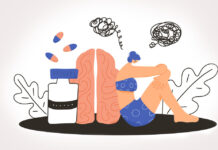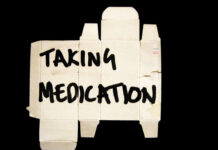Researchers Seek Standardized and Safe Antidepressant Tapering Protocol
A new study promotes the use of a standardized approach to antidepressant tapering.
Keys to Successful Discontinuation of Antipsychotic Medication
Qualitative study finds that both internal resources and systemic factors play a role in antipsychotic discontinuation outcomes.
Gradual Tapering Recommended for Antidepressant Discontinuation
A new literature review reinforces the need to “down-titrate” or taper antidepressants, especially drugs like Celexa and Paxil.
Finding One’s Way Through Withdrawal
Prescribers are taught to prescribe psychiatric medication, but they are often not well-educated about the effects on patients of discontinuing these medications.
Cochrane Review Calls for More Research on Antidepressant Withdrawal
Researchers find a lack of current literature on safe, effective ways to manage antidepressant withdrawal and make suggestions for future research.
The Bitterest Pills: The Troubling Story of Antipsychotic Drugs
As I see it this website is about filling the gaping hole in the official literature on mental health problems and their treatment. Since these problems were declared to be diseases, ‘just like any other’, academic papers present them as if they were simply technical glitches in the way the brain or mind works. They can be identified by ticking a few boxes, and easily treated by tweaking the corresponding defect with a drug or a few sessions of quick-fix therapy. What it is like to experience these problems and their treatments is nowhere to be found. Yet in post after post on this site among others, we hear about the harm produced by drugs that are prescribed for mental health problems.
Psychiatric Drug Withdrawal in Spain
My study, in which I slowly withdrew people from prescribed antipsychotics and antidepressants, found that it is possible to decrease both spending on psychiatric drugs and patients' chronic exposure to them. In general, the drug-reduction process was well-tolerated and well-accepted among those treated.
New Guidance on Antidepressant Withdrawal for Doctors in the UK
New guidance for primary care doctors in the UK on antidepressant discontinuation acknowledges severe and long-lasting withdrawal symptoms.
Pilots Crashing on Antidepressants: A (Not So) Brief History
With the current focus on the possible contribution of psychoactive drugs to the crash of GermanWings flight A320 on Tuesday, March 24, it is useful to identify potential links between the effect of the antidepressants and the events. In all 47 cases listed on SSRIstories, the pilots were taking antidepressant medications, mostly SSRIs, often in combination with other medications and sometimes with alcohol.
Online Experts on Withdrawal
Online communities are stepping in to help people facing withdrawal effects amass information and receive support for their withdrawal experiences.
A Different Psychiatry Is Needed for Discontinuing Antidepressants
The problems related to the use of antidepressants cannot be solved by an oversimplified psychiatry brainwashed by the pharmaceutical industry.
Researchers Provide Guidance for Reducing and Stopping Psychiatric Drugs
New guidance on how to taper and discontinue from psychiatric drugs from leading researchers Mark Horowitz and David Taylor.
STOP or GO? Tapering Pregnant Women off of Antidepressants
A team in the Netherlands is currently investigating the effects of tapering off of antidepressants known as selective serotonin reuptake inhibitors (SSRIs) during pregnancy....
Common Benzodiazepine Sedatives May Induce Aggression
Benzodiazepine medications that are commonly used for calming or sedating people can sometimes apparently cause violent or aggressive responses in some people, according to...
New Research on Patient-Centered Deprescribing for Antipsychotics
Researchers review the risks and benefits of deprescribing from antipsychotic drugs and advocate for a patient-centered approach to tapering.
A Tale of Two Studies
With increasing evidence that psychiatric drugs do more harm than good over the long term, the field of psychiatry often seems focused on sifting through the mounds of research data it has collected, eager to at last sit up and cry, here’s a shiny speck of gold! Our drugs do work! One recently published study on withdrawal of antipsychotics tells of long-term benefits. A second tells of long-term harm. Which one is convincing?
Tapered Antipsychotic Withdrawal Mitigates Risk of Psychotic Symptoms
Research suggests that slowly tapering off an antipsychotic reduces the risk of withdrawal psychosis compared to abrupt discontinuation.
Existential Therapy Assists Patients Withdrawing From Psychiatric Drugs
Confronting existential anxiety through “Basal Exposure Therapy” shows promising results in people withdrawing from psychotropic drugs.
Psychiatric Drugs: More Dangerous Than You Ever Imagined (A New Video)
“Psychiatric Drugs are More Dangerous than You Ever Imagined” is the newest video in my series Simple Truths about Psychiatry. It provides a simple, direct and inescapable warning about this epidemic of harm induced by psychiatric drugs. The video sounds a necessary alarm about this growing tragedy, involving millions of people and their families, who never foresaw the disabling results of taking psychiatric drugs and giving them to their children.
Danish Study Finds Better 10-year Outcomes in Patients Off Antipsychotics
Study finds that 74% of patients with a psychotic disorder off antipsychotics at end of 10 years are in remission.
The Review on Antidepressant Withdrawal That Cochrane Won’t Publish
Peter Gøtzsche and Anders Sørensen on trying to get a review of methods for safe antidepressant withdrawal published in Cochrane: "They sent us on a mission that was impossible to accomplish" to "protect the psychiatric guild."
Researchers: Antidepressant Withdrawal, Not “Discontinuation Syndrome”
Researchers suggest that the pharmaceutical industry had a vested interest in using the term “discontinuation” in order to hide the severity of physical dependence and withdrawal reactions many people experience from antidepressants.
Stopping the Madness: Coming Off Psychiatric Medications
Millions of patients find themselves caught in the web of psychiatric sorcery - a spell cast, hexed, potentially for life. They are told that they have chemical imbalances. They are told that the most important thing they can do for themselves is to "take their medication," and that they will have to do so "for life." Most egregiously, patients are sold the belief that medication is treating their disease rather than inducing a drug effect no different than alcohol or cocaine. That antidepressants and antipsychotics, for example, have effects like sedation or blunting of affect, is not a question. That these effects are reversible after long-term exposure is.
Components for a Good Neuroleptic Withdrawal Program
The United States desperately needs good programs to help people withdraw from neuroleptic drugs. From all I have seen and heard, there aren’t any - none at least that can reputably claim to get good results on a fairly consistent basis. Again and again I find myself challenged to envision such a program, and in reply to the challenge I have broken down this hypothetical program into various components.
Antidepressants Actually Reduce Serotonin Levels
Common scientific beliefs about serotonin levels in depression and how antidepressants act on the brain appear to be completely backwards.





























